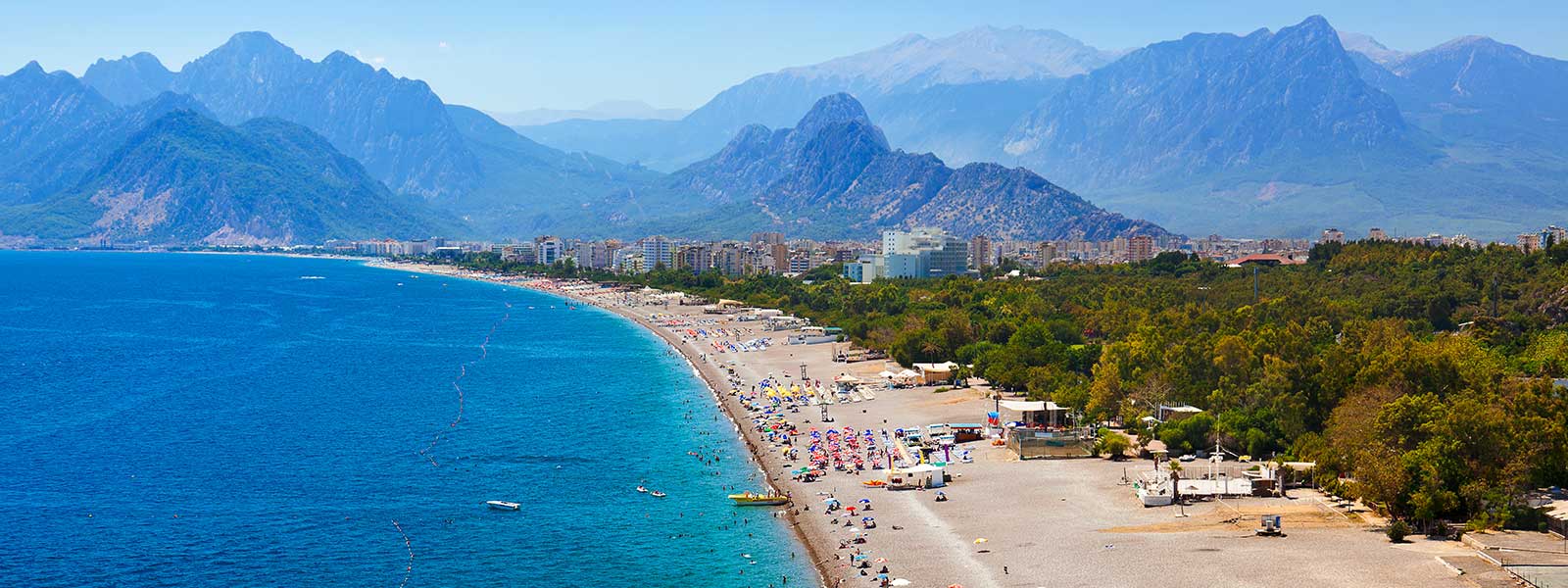
ANTALYA
The name Antalya is believed to be derived from the King of Pergamon, Attalos II, and the founder of it around 200 BC. Along the history of Turkey, you can see that the city was subdued to the Roman Empire, Byzantine, and Ottoman Empire respectively.
The region, offering all the mysticism of past in our day, is now called the Turkish Riviera due to its archaeological and natural beauties. Antalya is the place where sea, sun, history, and nature constitute a perfect harmony and which also includes the most beautiful and clearest coast along the Mediterranean. It still preserves its importance as a center throughout history on the south shore of the country, in addition to its incredible natural beauties. The mythological city which housed the Gods and Goddesses now exhibits all its secrets and marvels to humankind. It is located in the west of the Mediterranean Region. In ancient times it covered all Pamphylia which means "the land of all tribes." The area deserves the name since it has witnessed many successive civilizations throughout history. In 1st century BC, The Pergamon King Attalus ordered his men to find the most beautiful piece of land on earth; he wanted them to find "heaven on earth." After a long search all over the world, they discovered this land and said "This must be the 'Heaven' " and King Attalus founded it giving it the name Attaleia. From then on many nations kept their eyes on the place. When the Romans took over the Pergamene Kingdom, Attaleia became an outstanding Roman settlement which the great Roman Emperor Hadrian visited in 130 AD; an arch was built in his honor which is now worth seeing. Then there came the Byzantines, after which the Seljuk Turks took over the place in 1207 and gave it a different name; Adalya and built the Yivli Minaret. The Ottomans followed the Seljuk Turks and finally within the Turkish Republic; it became a Turkish city and an important port.
It has been growing rapidly since 1960, and its population is 1.146.109 according to the 1990 census. The climate of the province is typical Mediterranean: hot and dry in summers and temperate and rainy in winters. The Sunshine is guaranteed from April to October, and the winters are pleasantly mild. The humidity is a little bit high, about 64%, and the average water temperature is 21.5 °C. It is a heavenly place where the summer season is about 8 - 9 months long. You may reach it from almost every destination in the country, and even from little towns, coach companies going there are available. It has an international airport which may connect you to the main cities. It has modern facilities including waiting rooms, restaurants, cafe bar, and a shopping center. When traveling by sea, one can use the Antalya - Venice Ferryboat line.
The location and its surrounding is an important and noteworthy touristic center on the Mediterranean Coast with its perfect climate and splendid harmony of archaeological, historical and natural beauties, throughout the year. Daily tours to surrounding touristic areas like Side, Alanya, and Termessos are available, in addition to longer tours to Pamukkale, Cappadocia or anywhere you would like to go. Professional tourist guides are also available.
The memorial Hadrian Arch and the Clock Tower are remarkable and date back to the Hellenistic era. Kaleici is the nucleus of a settlement which embraced many civilizations during the time. It is now restored and has become a most attractive touristic center with its hotels, restaurants, shopping and entertainment facilities. Kaleici retains all the original ancient Turkish archaeological characteristics. The port's marina has been completely restored and is well worth visiting. The restoration activities in Kaleici won the Golden Apple Prize, the Oscar of tourism.
The Antalya Museum is one of the most notable archaeology museums in the world. It is also the only museum in Turkey with a children's department exhibiting ancient monuments appealing to children.
Hadrian's Gate, this ornamental marble arch was constructed in 2nd century BC by the Romans in honor of Emperor Hadrian. It is the most fantastic area in the whole ancient Pamphylia region.
Kesik Minaret, once a Byzantine Panagia church, later converted into a mosque. Yivli Minaret, this fluted minaret of the 13th century was built by the Seljuks. Decorated with dark blue and turquoise tiles, the minaret eventually became the symbol of the city. Karatay Medresesi, Hidirlik Tower, Ahi Yusuf Mescidi, Iskele Mosque, Murat Pasha Mosque, Tekeli Mehmet Pasha Mosque, Balibey Mosque, Musellim, Seyh Sinan Efendi and Osman Efendi Mosques are other places to be visited. "Han" is a Seljuk and Ottoman in which has architectural significance. Some worth visiting are the Evdür Han, Kirkoz Han, Alara Han and Castle, and Sarapsa (Serapsu) Han.
Termessos is a Pisidian settlement with remnants of an agora, theater, and an Odeon. It has a reputation of being the most magnificent necropolis on the Mediterranean, 35 km northwest of Antalya. Perge is 18 km northeast of which ruins are spread on two hills, the theater on one and the Acropolis on the other. According to the legend, the city was built by three heroes from Troy.
Sillyon is 34 km on the Alanya direction which is situated between Aspendos-Perge and dates back to 4th century BC. Aspendos is one of the most important Pamphylian cities. It is located on the point where the Kopru River meets the sea. Once an important port and a commercial center, it has a reputation for raising the best horses on earth. The Odeon, Basilica, Galleria and the fountains are worth seeing.
